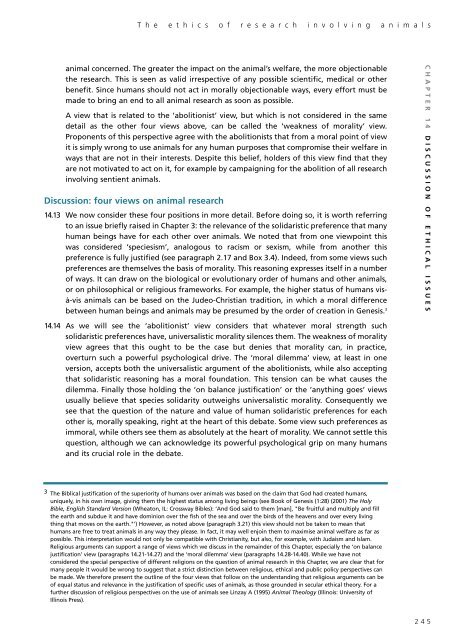The ethics of research involving animals - Nuffield Council on ...
The ethics of research involving animals - Nuffield Council on ...
The ethics of research involving animals - Nuffield Council on ...
You also want an ePaper? Increase the reach of your titles
YUMPU automatically turns print PDFs into web optimized ePapers that Google loves.
T h e e t h i c s o f r e s e a r c h i n v o l v i n g a n i m a l s<br />
animal c<strong>on</strong>cerned. <str<strong>on</strong>g>The</str<strong>on</strong>g> greater the impact <strong>on</strong> the animal’s welfare, the more objecti<strong>on</strong>able<br />
the <str<strong>on</strong>g>research</str<strong>on</strong>g>. This is seen as valid irrespective <str<strong>on</strong>g>of</str<strong>on</strong>g> any possible scientific, medical or other<br />
benefit. Since humans should not act in morally objecti<strong>on</strong>able ways, every effort must be<br />
made to bring an end to all animal <str<strong>on</strong>g>research</str<strong>on</strong>g> as so<strong>on</strong> as possible.<br />
A view that is related to the ‘aboliti<strong>on</strong>ist’ view, but which is not c<strong>on</strong>sidered in the same<br />
detail as the other four views above, can be called the ‘weakness <str<strong>on</strong>g>of</str<strong>on</strong>g> morality’ view.<br />
Prop<strong>on</strong>ents <str<strong>on</strong>g>of</str<strong>on</strong>g> this perspective agree with the aboliti<strong>on</strong>ists that from a moral point <str<strong>on</strong>g>of</str<strong>on</strong>g> view<br />
it is simply wr<strong>on</strong>g to use <str<strong>on</strong>g>animals</str<strong>on</strong>g> for any human purposes that compromise their welfare in<br />
ways that are not in their interests. Despite this belief, holders <str<strong>on</strong>g>of</str<strong>on</strong>g> this view find that they<br />
are not motivated to act <strong>on</strong> it, for example by campaigning for the aboliti<strong>on</strong> <str<strong>on</strong>g>of</str<strong>on</strong>g> all <str<strong>on</strong>g>research</str<strong>on</strong>g><br />
<str<strong>on</strong>g>involving</str<strong>on</strong>g> sentient <str<strong>on</strong>g>animals</str<strong>on</strong>g>.<br />
Discussi<strong>on</strong>: four views <strong>on</strong> animal <str<strong>on</strong>g>research</str<strong>on</strong>g><br />
14.13 We now c<strong>on</strong>sider these four positi<strong>on</strong>s in more detail. Before doing so, it is worth referring<br />
to an issue briefly raised in Chapter 3: the relevance <str<strong>on</strong>g>of</str<strong>on</strong>g> the solidaristic preference that many<br />
human beings have for each other over <str<strong>on</strong>g>animals</str<strong>on</strong>g>. We noted that from <strong>on</strong>e viewpoint this<br />
was c<strong>on</strong>sidered ‘speciesism’, analogous to racism or sexism, while from another this<br />
preference is fully justified (see paragraph 2.17 and Box 3.4). Indeed, from some views such<br />
preferences are themselves the basis <str<strong>on</strong>g>of</str<strong>on</strong>g> morality. This reas<strong>on</strong>ing expresses itself in a number<br />
<str<strong>on</strong>g>of</str<strong>on</strong>g> ways. It can draw <strong>on</strong> the biological or evoluti<strong>on</strong>ary order <str<strong>on</strong>g>of</str<strong>on</strong>g> humans and other <str<strong>on</strong>g>animals</str<strong>on</strong>g>,<br />
or <strong>on</strong> philosophical or religious frameworks. For example, the higher status <str<strong>on</strong>g>of</str<strong>on</strong>g> humans visà-vis<br />
<str<strong>on</strong>g>animals</str<strong>on</strong>g> can be based <strong>on</strong> the Judeo-Christian traditi<strong>on</strong>, in which a moral difference<br />
between human beings and <str<strong>on</strong>g>animals</str<strong>on</strong>g> may be presumed by the order <str<strong>on</strong>g>of</str<strong>on</strong>g> creati<strong>on</strong> in Genesis. 3<br />
CHAPTER 14 DISCUSSION OF ETHICAL ISSUES<br />
14.14 As we will see the ‘aboliti<strong>on</strong>ist’ view c<strong>on</strong>siders that whatever moral strength such<br />
solidaristic preferences have, universalistic morality silences them. <str<strong>on</strong>g>The</str<strong>on</strong>g> weakness <str<strong>on</strong>g>of</str<strong>on</strong>g> morality<br />
view agrees that this ought to be the case but denies that morality can, in practice,<br />
overturn such a powerful psychological drive. <str<strong>on</strong>g>The</str<strong>on</strong>g> ‘moral dilemma’ view, at least in <strong>on</strong>e<br />
versi<strong>on</strong>, accepts both the universalistic argument <str<strong>on</strong>g>of</str<strong>on</strong>g> the aboliti<strong>on</strong>ists, while also accepting<br />
that solidaristic reas<strong>on</strong>ing has a moral foundati<strong>on</strong>. This tensi<strong>on</strong> can be what causes the<br />
dilemma. Finally those holding the ‘<strong>on</strong> balance justificati<strong>on</strong>’ or the ‘anything goes’ views<br />
usually believe that species solidarity outweighs universalistic morality. C<strong>on</strong>sequently we<br />
see that the questi<strong>on</strong> <str<strong>on</strong>g>of</str<strong>on</strong>g> the nature and value <str<strong>on</strong>g>of</str<strong>on</strong>g> human solidaristic preferences for each<br />
other is, morally speaking, right at the heart <str<strong>on</strong>g>of</str<strong>on</strong>g> this debate. Some view such preferences as<br />
immoral, while others see them as absolutely at the heart <str<strong>on</strong>g>of</str<strong>on</strong>g> morality. We cannot settle this<br />
questi<strong>on</strong>, although we can acknowledge its powerful psychological grip <strong>on</strong> many humans<br />
and its crucial role in the debate.<br />
3 <str<strong>on</strong>g>The</str<strong>on</strong>g> Biblical justificati<strong>on</strong> <str<strong>on</strong>g>of</str<strong>on</strong>g> the superiority <str<strong>on</strong>g>of</str<strong>on</strong>g> humans over <str<strong>on</strong>g>animals</str<strong>on</strong>g> was based <strong>on</strong> the claim that God had created humans,<br />
uniquely, in his own image, giving them the highest status am<strong>on</strong>g living beings (see Book <str<strong>on</strong>g>of</str<strong>on</strong>g> Genesis (1:28) (2001) <str<strong>on</strong>g>The</str<strong>on</strong>g> Holy<br />
Bible, English Standard Versi<strong>on</strong> (Wheat<strong>on</strong>, IL: Crossway Bibles): ‘And God said to them [man], "Be fruitful and multiply and fill<br />
the earth and subdue it and have domini<strong>on</strong> over the fish <str<strong>on</strong>g>of</str<strong>on</strong>g> the sea and over the birds <str<strong>on</strong>g>of</str<strong>on</strong>g> the heavens and over every living<br />
thing that moves <strong>on</strong> the earth."’) However, as noted above (paragraph 3.21) this view should not be taken to mean that<br />
humans are free to treat <str<strong>on</strong>g>animals</str<strong>on</strong>g> in any way they please. In fact, it may well enjoin them to maximise animal welfare as far as<br />
possible. This interpretati<strong>on</strong> would not <strong>on</strong>ly be compatible with Christianity, but also, for example, with Judaism and Islam.<br />
Religious arguments can support a range <str<strong>on</strong>g>of</str<strong>on</strong>g> views which we discuss in the remainder <str<strong>on</strong>g>of</str<strong>on</strong>g> this Chapter, especially the ‘<strong>on</strong> balance<br />
justificati<strong>on</strong>’ view (paragraphs 14.21-14.27) and the ‘moral dilemma’ view (paragraphs 14.28-14.40). While we have not<br />
c<strong>on</strong>sidered the special perspective <str<strong>on</strong>g>of</str<strong>on</strong>g> different religi<strong>on</strong>s <strong>on</strong> the questi<strong>on</strong> <str<strong>on</strong>g>of</str<strong>on</strong>g> animal <str<strong>on</strong>g>research</str<strong>on</strong>g> in this Chapter, we are clear that for<br />
many people it would be wr<strong>on</strong>g to suggest that a strict distincti<strong>on</strong> between religious, ethical and public policy perspectives can<br />
be made. We therefore present the outline <str<strong>on</strong>g>of</str<strong>on</strong>g> the four views that follow <strong>on</strong> the understanding that religious arguments can be<br />
<str<strong>on</strong>g>of</str<strong>on</strong>g> equal status and relevance in the justificati<strong>on</strong> <str<strong>on</strong>g>of</str<strong>on</strong>g> specific uses <str<strong>on</strong>g>of</str<strong>on</strong>g> <str<strong>on</strong>g>animals</str<strong>on</strong>g>, as those grounded in secular ethical theory. For a<br />
further discussi<strong>on</strong> <str<strong>on</strong>g>of</str<strong>on</strong>g> religious perspectives <strong>on</strong> the use <str<strong>on</strong>g>of</str<strong>on</strong>g> <str<strong>on</strong>g>animals</str<strong>on</strong>g> see Linzay A (1995) Animal <str<strong>on</strong>g>The</str<strong>on</strong>g>ology (Illinois: University <str<strong>on</strong>g>of</str<strong>on</strong>g><br />
Illinois Press).<br />
245
















